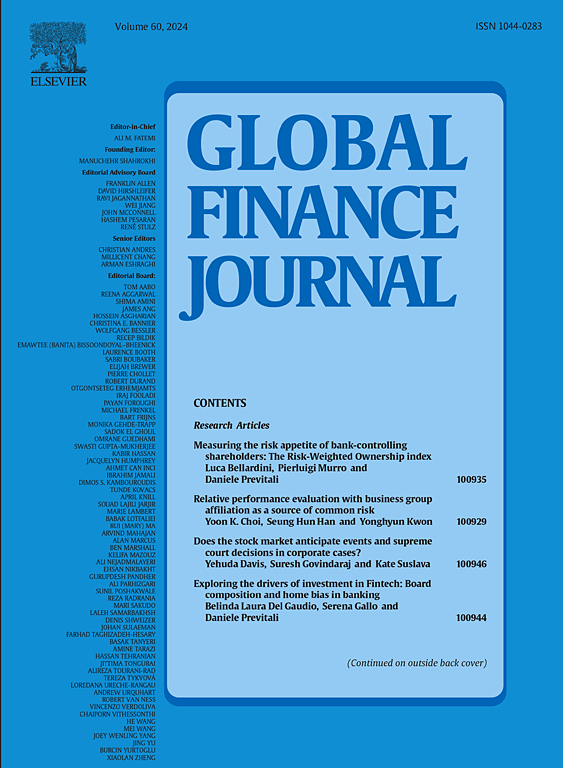国内外金融压力对亚太国家股票收益的影响
IF 5.5
2区 经济学
Q1 BUSINESS, FINANCE
引用次数: 0
摘要
本研究采用先进的基于分位数的方法,研究了国内外金融压力对10个亚太国家股市表现的影响。利用小波分位数相关和多元分位数对分位数回归模型,分析了不同市场条件下的非线性、非对称和时频依赖关系。结果表明,外国金融压力对股票回报产生了更为一致和明显的负面影响,特别是在泰国和韩国等依赖出口的经济体。相比之下,国内金融压力的影响因国家而异。在菲律宾等结构较弱的经济体中观察到持续的负面影响,而中国、印度和澳大利亚等市场表现出适应性,在某些条件下相关性变为中性或正。这些发现强调了经济结构、贸易风险和金融市场特征差异所形成的显著异质性。通过比较全球和国内金融压力的影响,本研究填补了文献中的一个重要空白。研究结果为致力于加强金融稳定的政策制定者和寻求有效投资组合多样化策略的投资者提供了可操作的见解。本文章由计算机程序翻译,如有差异,请以英文原文为准。
Effects of domestic and foreign financial stress on stock returns in Asia-Pacific countries
This study employs advanced quantile-based methodologies to investigate the effects of domestic and foreign financial stress on stock market performance across 10 Asia–Pacific countries. Using wavelet quantile correlation and multivariate quantile-on-quantile regression models, we analyze the nonlinear, asymmetric, and time–frequency-dependent relationships under varying market conditions. Results show that foreign financial stress exerts a more consistent and pronounced negative impact on stock returns, particularly in export-dependent economies such as Thailand and Korea. In contrast, the effects of domestic financial stress vary by country. Persistent negative impacts are observed in structurally weaker economies like the Philippines, whereas markets such as China, India, and Australia display adaptability, with correlations shifting to neutral or positive under certain conditions. These findings underscore the significant heterogeneity shaped by differences in economic structure, trade exposure, and financial market characteristics. By comparing the effects of both global and domestic financial stress, this study fills an important gap in the literature. The results provide actionable insights for policymakers working to strengthen financial stability and for investors pursuing effective portfolio diversification strategies.
求助全文
通过发布文献求助,成功后即可免费获取论文全文。
去求助
来源期刊

Global Finance Journal
BUSINESS, FINANCE-
CiteScore
7.30
自引率
13.50%
发文量
106
审稿时长
53 days
期刊介绍:
Global Finance Journal provides a forum for the exchange of ideas and techniques among academicians and practitioners and, thereby, advances applied research in global financial management. Global Finance Journal publishes original, creative, scholarly research that integrates theory and practice and addresses a readership in both business and academia. Articles reflecting pragmatic research are sought in areas such as financial management, investment, banking and financial services, accounting, and taxation. Global Finance Journal welcomes contributions from scholars in both the business and academic community and encourages collaborative research from this broad base worldwide.
 求助内容:
求助内容: 应助结果提醒方式:
应助结果提醒方式:


